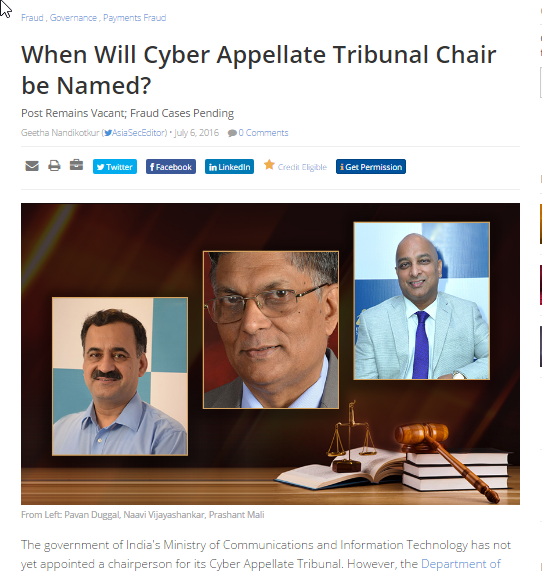According to the article published in Bankinfosecurity.in, it appears that the wait of the Cyber Crime victims for CyAT (Cyber Appellate Tribunal) chairperson to be appointed is still not over. Going by the statement of the registrar of CyAT quoted in the article, there appears to be no agreement on the appointment till date.
Now that Mr Ravishankar Prasad is the Minister for both the IT Ministry and the Law Ministry, there cannot be any difficulty in finalizing the candidate from the Government side. It is the Judiciary which is unable to accept any appointment recommended by the Government and is stalling the process of appointment. This will not only inconvenience the public but also further burden the Courts with litigation which could be disposed off by the alternate means of CAT to some extent.
If the Ministry was unable to find a proper person, I would have expected the Judiciary to voluntarily suggest a suitable person from its own search amongst the community of retired Judges, instead of standing on formalities and protocol over citizen centric action. As a result of this lack of flexibility in administration, the standoff between the Judiciary and the Government on the appointment of Judges has not yet been resolved.
Management professional agree that when professionals and experts in specific fields take over administrative duties, they are often unable to see the different requirements of administration and prioritize it over other domain specific issues. Such things are normally seen when say a renowned scientist becomes the head of an organization or even when the best software developer becomes the head of a software company, or a famous surgeon becomes the head of a Hospital or an excellent Engineer becomes the CEO of his engineering firm. Similarly, while Modi has effectively switched hats from being a politician to being the administrative head of the country, Mr Kejriwal has not been able to make a similar switch.
The Role of being an expert in a field and Being a good administrator are different and one has to make a conscious effort to be able to successfully wear the two hats simultaneously.
Perhaps, a similar issue is affecting the administration of Judiciary which is in the hands of professional Judges both at the State and the Central level. Good Judges donot always make good Justice administrators whether they are Chief Justices in a State level High Court or the Chief Justice of India. Some may be adaptive and successfully change over from sitting on the Judicial bench to behind the office table with ease but some may find it difficult.
It is time that the Judiciary becomes conscious of this possibility and takes corrective steps as may be necessary. It is also time for the CJI shows some statesmanship in dealing with the Government and take steps to overcome the differences and facilitate the movement of the wheels of justice.
We, the Citizens of India often see that Supreme Court is more interested in spending its time on worthless Celebrity cases and Political cases and show no urgency in disposing off issues involving interest of individuals. Citizens of India have nothing to gain from such lopsided prioritization of justice delivery under a false sense of “Independent Judiciary” when for most members of public, there is “No Judiciary”.
A standing example of such skewed prioritization is the lack of attention on this appointment of the Chair person of Cyber Appellate Tribunal pending from June 2011 where one (not hundred judges for different Courts) suitable person has not been found for last 5 years.
Naavi








